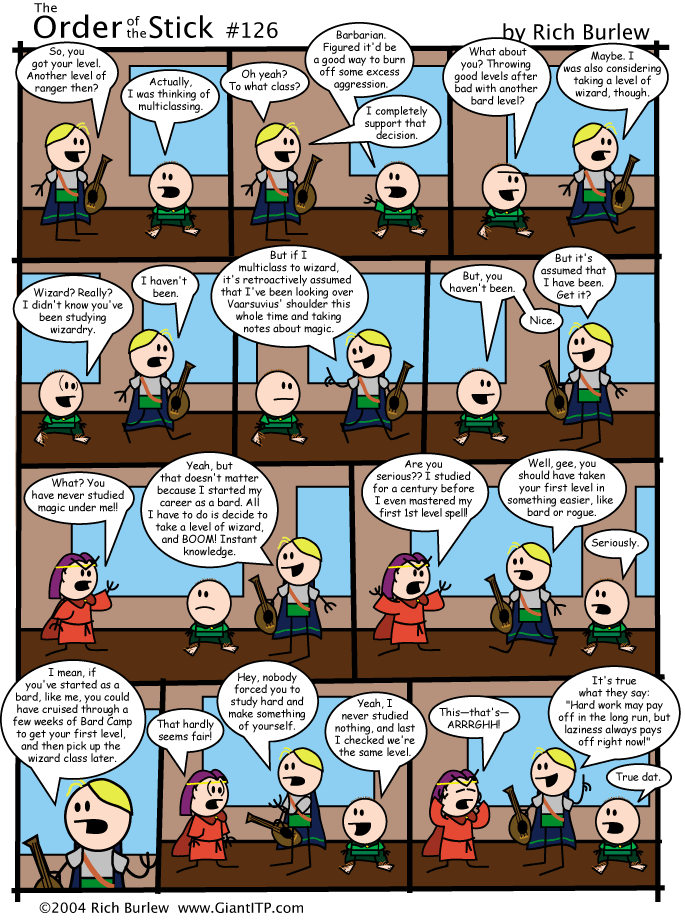-
Welcome to rpgcodex.net, a site dedicated to discussing computer based role-playing games in a free and open fashion. We're less strict than other forums, but please refer to the rules.
"This message is awaiting moderator approval": All new users must pass through our moderation queue before they will be able to post normally. Until your account has "passed" your posts will only be visible to yourself (and moderators) until they are approved. Give us a week to get around to approving / deleting / ignoring your mundane opinion on crap before hassling us about it. Once you have passed the moderation period (think of it as a test), you will be able to post normally, just like all the other retards.
You are using an out of date browser. It may not display this or other websites correctly.
You should upgrade or use an alternative browser.
You should upgrade or use an alternative browser.
Game News Bloodlines 2 Clan Introduction - Thinbloods
- Thread starter Infinitron
- Start date
Delterius
Arcane
mebbe pull 2 can pull rats• Pull (Blood Cost: 0/1, target dependent) is Mentalism’s first active. It allows the vampire to manipulate inanimate objects from afar - whether that’s an inconvenient obstacle, or the knife in the hands of the NPC bearing down on them. The • • slot upgrades Pull even further.
Rats are not inanimate objects. Poor attention to detail in this video.
jungl
Augur
- Joined
- Mar 30, 2016
- Messages
- 1,478
Im expecting kotor 2 cringe writing from the first game. Replace the force with your blood. Npcs will say how stronk ur blood is for a supposed thin blood. Then the story will come to a point where its "oh maybe your not exactly a thin blood but show traits of "x" clan". Then your likely going have to suck the dick (literally) of the clan head you joining cause its 2019 WoD and thats how they do blood bonds now.
Vaarna_Aarne
Notorious Internet Vandal
In V5 Camarilla uses promise of allowing diablerie of a Blood Hunt target (or more accurately, just diablerie of a restrained condemned, it's a carrot for playing ball after all) as an active tool of (covert) recruitment of Thin-bloods. After all, a Blood Hunt's the one time Camarilla fully sanctions diablerie in general.How does the "thinblood" joins the clan exactly?
Diablerie only. But why would a society that treats Diablerie as one of the biggest no-no's accept you, and worse still, why would a Clan whose member you fucking cannibalized greet you with open arms is anyone's guess.

Space Satan
Arcane

But it was stated in the rulebook that Camarilla uses diablerie as a sort of "hidden motivation" for new recruits as a means of, ahem, promotion.Diablerie only. But why would a society that treats Diablerie as one of the biggest no-no's accept you, and worse still, why would a Clan whose member you fucking cannibalized greet you with open arms is anyone's guess.
Lambach
Arcane

Right, I keep forgetting this is V5 we're dealing with. Some of these brilliant changes make Rudi look like a well-written character in comparison.
I am pretty sure that short videos like this are meant to keep Bloodlines 2 on the ear of people.
On the "ear" is the right phrasing, because nobody really wants to "see" those shitty Beamdog application portfolios.
Vaarna_Aarne
Notorious Internet Vandal
That's been a thing for a long time tho, that Blood Hunts tacitly permit diablerie. Or to quote 20E, pardon diablerie when the Sixth Tradition is used.Right, I keep forgetting this is V5 we're dealing with. Some of these brilliant changes make Rudi look like a well-written character in comparison.
The only new thing V5 added to it is that they specifically dangle it for Thin-Bloods as a perk for doing what you're told and keeping your mouth shut about the arrangement like a good snitch.
Crichton
Prophet
- Joined
- Jul 7, 2004
- Messages
- 1,221
I'm not any kind of expert on the bottomless abyss of White Wolf PnP lore, but having played the first Bloodlines, the "starting as a thin-blood" thing doesn't sound like a big deal. I don't think one needs some sort of fancy vampire-cannabalism explanation for it either.
Chapter 1: Play as a lowly thin-blood using the generic powers.
Chapter 2: Find out you have hidden talents; a screen pops up and you choose what sort of vampire bit you in the intro. You then demonstrate your lineage to whatever clan you chose and are accepted as a bottom-tier member, receiving training in using your new powers and working your way up the Skinner Box.
Essentially, character creation happens the same way, it's just delayed by a chapter so you can get your feet wet first.
TDLR:

Chapter 1: Play as a lowly thin-blood using the generic powers.
Chapter 2: Find out you have hidden talents; a screen pops up and you choose what sort of vampire bit you in the intro. You then demonstrate your lineage to whatever clan you chose and are accepted as a bottom-tier member, receiving training in using your new powers and working your way up the Skinner Box.
Essentially, character creation happens the same way, it's just delayed by a chapter so you can get your feet wet first.
TDLR:

Tuco Benedicto Pacifico
Arcane
Yeah, but the problem with a thinblood isn't really about "having the traits of your clan from the get go" as much as the fact that (and admittedly I'm not an expert of the lore and I got this just playing Bloodlines) as one you are supposed to be a weakling, a useless piece of trash of virtually no worth nor potential for growth, by vampire standards.I'm not any kind of expert on the bottomless abyss of White Wolf PnP lore, but
Chapter 1: Play as a lowly thin-blood using the generic powers.
Chapter 2: Find out you have hidden talents; a screen pops up and you choose what sort of vampire bit you in the intro.
And then you suddenly become strong, play a significant role in the story and join the club for popular kids being even able to join any clan of your choice?
It... seems a bit far fetched, unless a diablerie is involved.
Crichton
Prophet
- Joined
- Jul 7, 2004
- Messages
- 1,221
Yeah, but the problem with a thinblood isn't really about "having the traits of your clan from the get go" as much as the fact that (and admittedly I'm not an expert of the lore and I got this just playing Bloodlines) as one you are supposed to be a weakling, a useless piece of trash of virtually no worth nor potential for growth, by vampire standards.I'm not any kind of expert on the bottomless abyss of White Wolf PnP lore, but
Chapter 1: Play as a lowly thin-blood using the generic powers.
Chapter 2: Find out you have hidden talents; a screen pops up and you choose what sort of vampire bit you in the intro.
And then you suddenly become strong, play a significant role in the story and join the club for popular kids being even able to join any clan of your choice?
It... seems a bit far fetched, unless a diablerie is involved.
In Bloodlines 1, we're introduced to a bunch of thin bloods that don't have super powers but I don't know that we're told that they couldn't possibly develop them. I mean, look at the PC in Bloodlines; he goes from being a totally useless fledgling to hyperpowered Vampire T-800 hosing down the Sheriff with a flamethrower and frying dozens of vampires with blood boil in what, a couple months of in-game time? I seem to recall one NPC even commenting on how the PC has more potential than he (or the other vampires) realize. The idea of choosing a clan was part of the first game too; moving the choice later in the game doesn't seem like a huge deal.
Tuco Benedicto Pacifico
Arcane
Yeah, but that was already bending the lore quite a lot (which several pointed out at the time) and there was the untold implication that your "sire" was some hot shit in terms of blood lineage, which made you abnormally full of potential.I mean, look at the PC in Bloodlines; he goes from being a totally useless fledgling to hyperpowered Vampire T-800 hosing down the Sheriff
You definitely weren't a thinblood, and in fact even as the newborn in town you were sent to deal with a bunch of them and you were supposed to be the boogeyman by their standards.
Crichton
Prophet
- Joined
- Jul 7, 2004
- Messages
- 1,221
Yeah, but that was already bending the lore quite a lot (which several pointed out at the time) and there was the untold implication that your "sire" was some hot shit in terms of blood lineage, which made you abnormally full of potential.I mean, look at the PC in Bloodlines; he goes from being a totally useless fledgling to hyperpowered Vampire T-800 hosing down the Sheriff
You definitely weren't a thinblood, and in fact even as the newborn in town you were sent to deal with a bunch of them and you were supposed to be the boogeyman by their standards.
It's possible that NPC vampires have some fullproof "thin-blood detection system" but from the PCs perspective in Bloodlines, the thing that struck me about the hobos on the beach wasn't weakness per se, but ignorance. Maybe if they'd been though the tutorial with Jack and knew to how to scroll through their discipline list, they'd be just like me. Perhaps another way to think about it is that the PC isn't really a thin-blood, he just appears as such until he gets the exposure to
Lambach
Arcane

In Bloodlines 1, we're introduced to a bunch of thin bloods that don't have super powers but I don't know that we're told that they couldn't possibly develop them. I mean, look at the PC in Bloodlines; he goes from being a totally useless fledgling to hyperpowered Vampire T-800 hosing down the Sheriff with a flamethrower and frying dozens of vampires with blood boil in what, a couple months of in-game time? I seem to recall one NPC even commenting on how the PC has more potential than he (or the other vampires) realize. The idea of choosing a clan was part of the first game too; moving the choice later in the game doesn't seem like a huge deal.
It's not the same. The PC's Generation in Bloodlines 1 was never officially confirmed, so for the PC there is some plausibility that he can be a lot more powerful than his age suggests (it's still very lore unfriendly, but theoretically it's plausible).
On the other hand, if you're a confirmed Thin-blood, it means you're 14-15th Generation and so far removed from Caine that you're barely a Vampire at all. You can't "discover a secret potential" when you're created with very little potential to begin with. In comparison, that's like expecting someone born with mental retardation to suddenly "grow" an above-average intelligence - it's physically impossible.
What often confuses people is the difference between Caitiff and Thin-bloods. Caitiff are (usually) full-blooded Vampires with equal potential, but are left Clanless and without knowledge of Kindred society for various reasons. Thin-bloods are the Vampire equivalents of people with severe genetic defects.
So does that mean "retard strength" is one of the thin-blood powers?In comparison, that's like expecting someone born with mental retardation to suddenly "grow" an above-average intelligence - it's physically impossible.
Latro
Arcane
i bet the player is some form of a chatterling
the chatterlings are thoroughly indoctrinated, intensively trained for hours on end both mentally and physically, and stripped of all humanity at an early age. They are forced to pick and follow a Path of Enlightenment while still human, so that they will be prepared for the Embrace when they reach 23 years old. Chatterlings are allowed to choose their own sires, and thus their own clan.
Vaarna_Aarne
Notorious Internet Vandal
It's been confirmed the PC starts as a Thin-Blood and gets to (optional?) pick a Clan later, so presumably Diablerie is involved.I'm not any kind of expert on the bottomless abyss of White Wolf PnP lore, but having played the first Bloodlines, the "starting as a thin-blood" thing doesn't sound like a big deal. I don't think one needs some sort of fancy vampire-cannabalism explanation for it either.
Chapter 1: Play as a lowly thin-blood using the generic powers.
Chapter 2: Find out you have hidden talents; a screen pops up and you choose what sort of vampire bit you in the intro. You then demonstrate your lineage to whatever clan you chose and are accepted as a bottom-tier member, receiving training in using your new powers and working your way up the Skinner Box.
The hidden talent thing is a different sort of thing. There isn't exactly a precedent for that sort of thing beyond having a low enough Generation, but that actually isn't that important anymore because of the (smart) introduction of Blood Potency so Generation is not so pivotally important anymore (the Bloodlines PC was basically like every other VtM PC because they had lowest Generation possible; V5 removes the Generation background option entirely). HOWEVER! This is not to say there isn't some sort of hidden talent thing beyond just being regularly worthy of being a PC. A sort of buried concept in VtM was that of Inceptor, basically a vampire that has the ability to create NEW disciplines (as in, not learn new, but create an entirely new discipline on their own). Normally this is a rare thing that has happened with low Generation exceptions, usually Bloodline founders, in example Baron Samedi, the founder of the Samedi bloodline, is/was a 5th Generation Cappadocian.
But, the exception to this rule was/is thin-blooded Caitiff (as said, this is an old thing that's basically been dropped to limbo and never really elaborated on or formalized, so everyone takes Generation Five-Dot) can ALSO create all-new disciplines. But this is more of an esoteric and probably not going to be even considered thing since I doubt even Hagen and the other old edgemasters remember this thing.
Well there's never really been any real explanation for how the Caitiff thing works (and it only raises further questions because certain Clans aren't exactly something you need to be told about to notice, in general Clan weaknesses being a curse rather than a psychosomatic thing makes this a whole can of worms that has just been avoided), and it's made further confusing because until V5 there were occasions where Caitiff/Panders and Thin-Bloods were treated interchangeably, and before V5 there actually wasn't anything stopping Thin-Bloods from being part of a Clan. V5 drew a line in the sand in this regards, and provided by far the most comprehensive look at Thin-Bloods so far.What often confuses people is the difference between Caitiff and Thin-bloods. Caitiff are (usually) full-blooded Vampires with equal potential, but are left Clanless and without knowledge of Kindred society for various reasons. Thin-bloods are the Vampire equivalents of people with severe genetic defects.
I have personally never liked this criticism of Bloodlines' handling of PC progression being somehow against how it should be (almost as much as I despise nerdwords like 'lore'). It is, I feel, a very myopic and literal reading of how XP is handled in VtM and WoD in general, and one that makes makes categorical one-size-fits-all assumptions of things like genre, tone, and entire stories. That's actually one thing where White Wolf always did a poor job with, the XP explanation in Revised Edition and V20 is staggering in how long it is for something that's basically just handwringing about details over what's really a very simple thing. This is one thing V5 improves at, since the XP segment is a single paragraph and is followed by The Golden Rule. Now, I have a lot of issues with Storyteller's XP system (well, I don't think there isn't a single XP system that I don't have axe to grind with), like I don't like how it instructs to give XP after every session (I feel this actively undermines pacing), but it should only be seen as a tool and a fairly intuitive tool at that (unlike the living nightmare that is d20 experience points), but that's all it is and should be seen as: A tool for handling character growth and change within a story and inside the context of a game.Yeah, but that was already bending the lore quite a lot (which several pointed out at the time) and there was the untold implication that your "sire" was some hot shit in terms of blood lineage, which made you abnormally full of potential.I mean, look at the PC in Bloodlines; he goes from being a totally useless fledgling to hyperpowered Vampire T-800 hosing down the Sheriff
You definitely weren't a thinblood, and in fact even as the newborn in town you were sent to deal with a bunch of them and you were supposed to be the boogeyman by their standards.
The best way to look at it in Bloodlines is that it's nothing to do with the character's Generation or anything of the sort. It's just that the PC gets shit done so they get better at getting shit done. If you look at it further, it also makes further sense because LaCroix is a pansy who has others do everything for him, which is why he's a complete pushover after his goons get mowed down by the massively bionic, hardcore, two-fisted yojimbo million dollar movie gangsta. And it's necessary for the story. Or alternatively, it's a video game, and it's more enjoyable if you don't raise each trait a single time over its entire course. Like, these aren't real things, nobody can actually objectively establish how long it takes for a vampire to git gud.
Tuco Benedicto Pacifico
Arcane
Every time the topic comes up it reminds me of this:Also the cabbie in Bloodlines is obviously intended to be Caine
https://youtu.be/M9x_koRZ2bA?t=114
Background Character
Arbiter
- Joined
- Jan 17, 2015
- Messages
- 781
This is a load of shit, you know that

https://outstar.itch.io/santa-monica-by-night
In this short game based on VTMB, the sire is depressed and lets his thinblooded childe diablerize him. I guess that's how it'll be in VTMB 2, as well.
In this short game based on VTMB, the sire is depressed and lets his thinblooded childe diablerize him. I guess that's how it'll be in VTMB 2, as well.
What if it's anarch's territory you start in? Don't think they give a fuck.But why would a society that treats Diablerie as one of the biggest no-no's accept you
Crichton
Prophet
- Joined
- Jul 7, 2004
- Messages
- 1,221
I'm not any kind of expert on the bottomless abyss of White Wolf PnP lore, but having played the first Bloodlines, the "starting as a thin-blood" thing doesn't sound like a big deal. I don't think one needs some sort of fancy vampire-cannabalism explanation for it either.
Chapter 1: Play as a lowly thin-blood using the generic powers.
Chapter 2: Find out you have hidden talents; a screen pops up and you choose what sort of vampire bit you in the intro. You then demonstrate your lineage to whatever clan you chose and are accepted as a bottom-tier member, receiving training in using your new powers and working your way up the Skinner Box.
It's been confirmed the PC starts as a Thin-Blood and gets to (optional?) pick a Clan later, so presumably Diablerie is involved.
I don't deny the possibility, but all the quote in the OP says is that the PC joins a clan, not that the PC (as opposed to the player) chooses one; which was my point above. In the first game, the player chooses a clan, the player character simply gets fucked and sucked by some random vampire bitch. I don't think there's any need to at this juncture to invoke anything that wasn't in the first game, including some ritual from Ann Rice Fanfiction Splatbook 543: Dick-suckers of the ancient Indus.
As for the whole "thin-blood" thing. We're literally talking about the difference between:
Bloodlines 1 Quest-giver: "Listen you worthless fledgling; despite your lowly status, I'm giving you one chance to prove your worth to our organization."
and
Bloodlines 2 Quest-giver: "Listen you worthless thin-blood; despite your lowly status, I'm giving you one chance to prove your worth to our organization."
You remember when NWN2 pre-release hype touted the fact that "You start out as a typical commoner"?
https://rpgcodex.net/forums/index.php?threads/pc-gamer-reveals-first-nwn-2-details.9863/
Pre-release bullshit never changes; don't get sucked in.

- Joined
- Sep 7, 2013
- Messages
- 6,332






How does the "thinblood" joins the clan exactly?
Diablerie only. But why would a society that treats Diablerie as one of the biggest no-no's accept you, and worse still, why would a Clan whose member you fucking cannibalized greet you with open arms is anyone's guess.

You can diablerie other vampires if they are under penalty of death (aka, blood hunt), and killing a criminal in this way is the major way a thin blood can join a clan.
Tuco Benedicto Pacifico
Arcane
PC Gamer just published a short thing that it would be generous to call an article about the first confirmed clan option: https://www.pcgamer.com/uk/vampire-the-masquerade-bloodlines-2-brujah-reveal/
Unsurprisingly it's Brujah.
Unsurprisingly it's Brujah.





















